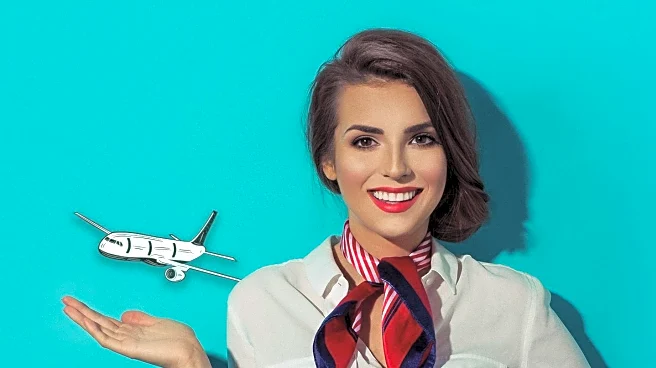What's Happening?
Flight attendants and travel experts are advising passengers against wearing flip-flops on airplanes due to safety and comfort concerns. Venezia Macias, a flight attendant based in Las Vegas, highlights that flip-flops, while convenient, are not ideal for air travel. In the event of an emergency evacuation, flimsy shoes like flip-flops can slow down passengers or leave them unprotected. Laura Asilis, a Travel + Leisure A-List Advisor, echoes these sentiments, emphasizing that closed shoes or supportive flats are safer options. Additionally, airplane cabins can be chilly, and flip-flops offer no protection against the cold or accidental injuries from fellow passengers. The cleanliness of airplane lavatories is another concern, as flip-flops provide minimal protection against unsanitary surfaces.
Why It's Important?
The advice from flight attendants and travel experts is significant for ensuring passenger safety and comfort during flights. In emergency situations, the ability to evacuate quickly and safely is paramount, and appropriate footwear plays a crucial role in this. Flip-flops, which can easily slip off, may hinder evacuation efforts and expose passengers to potential hazards. Furthermore, the comfort and hygiene aspects are important for a pleasant travel experience. Closed shoes not only keep passengers warmer but also protect against accidental injuries and unsanitary conditions in airplane lavatories. This guidance can help travelers make informed decisions about their attire, enhancing their overall travel experience.
What's Next?
Travelers may start reconsidering their choice of footwear for flights, opting for more secure and protective options like sneakers or loafers. Airlines might also consider providing more detailed guidelines on appropriate travel attire to enhance passenger safety and comfort. As awareness grows, passengers could become more mindful of their travel preparations, prioritizing safety and hygiene. This shift in behavior could lead to a broader discussion on travel safety standards and the role of airlines in educating passengers about best practices.
Beyond the Headlines
The advice against wearing flip-flops on planes highlights broader issues of travel safety and passenger preparedness. It underscores the importance of considering practical aspects of travel attire that go beyond fashion and convenience. This focus on safety and hygiene could lead to increased awareness and changes in travel habits, potentially influencing airline policies and passenger expectations. The discussion also touches on the cultural aspects of travel, where comfort and style often compete with practicality and safety.









